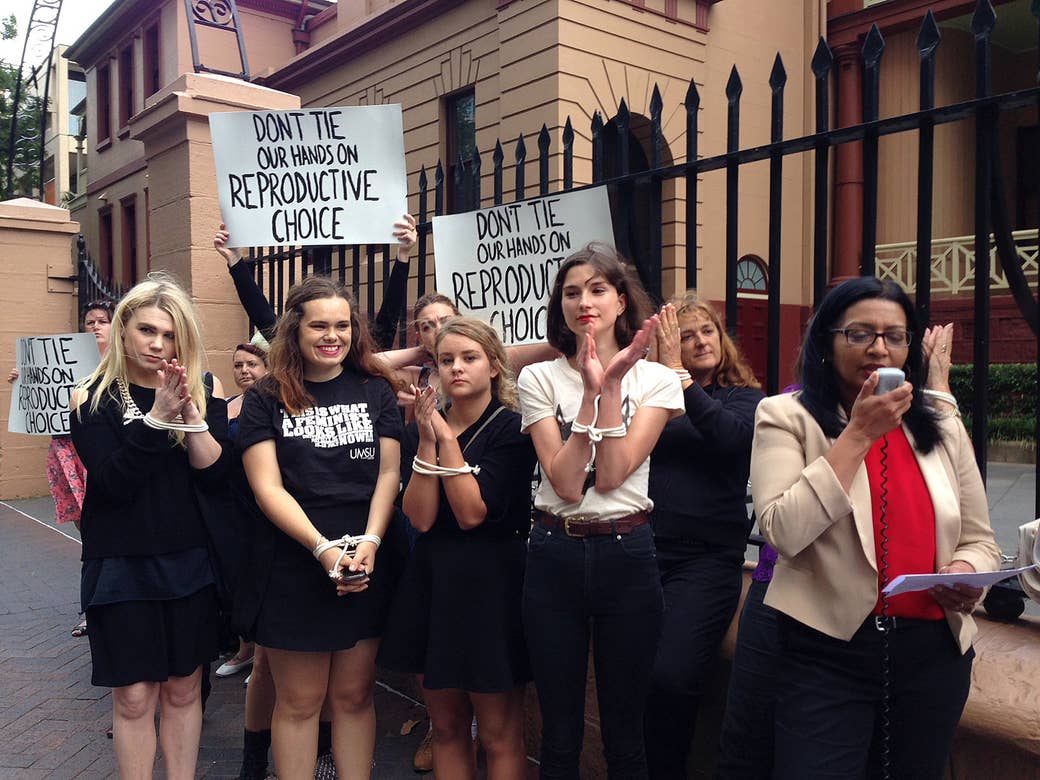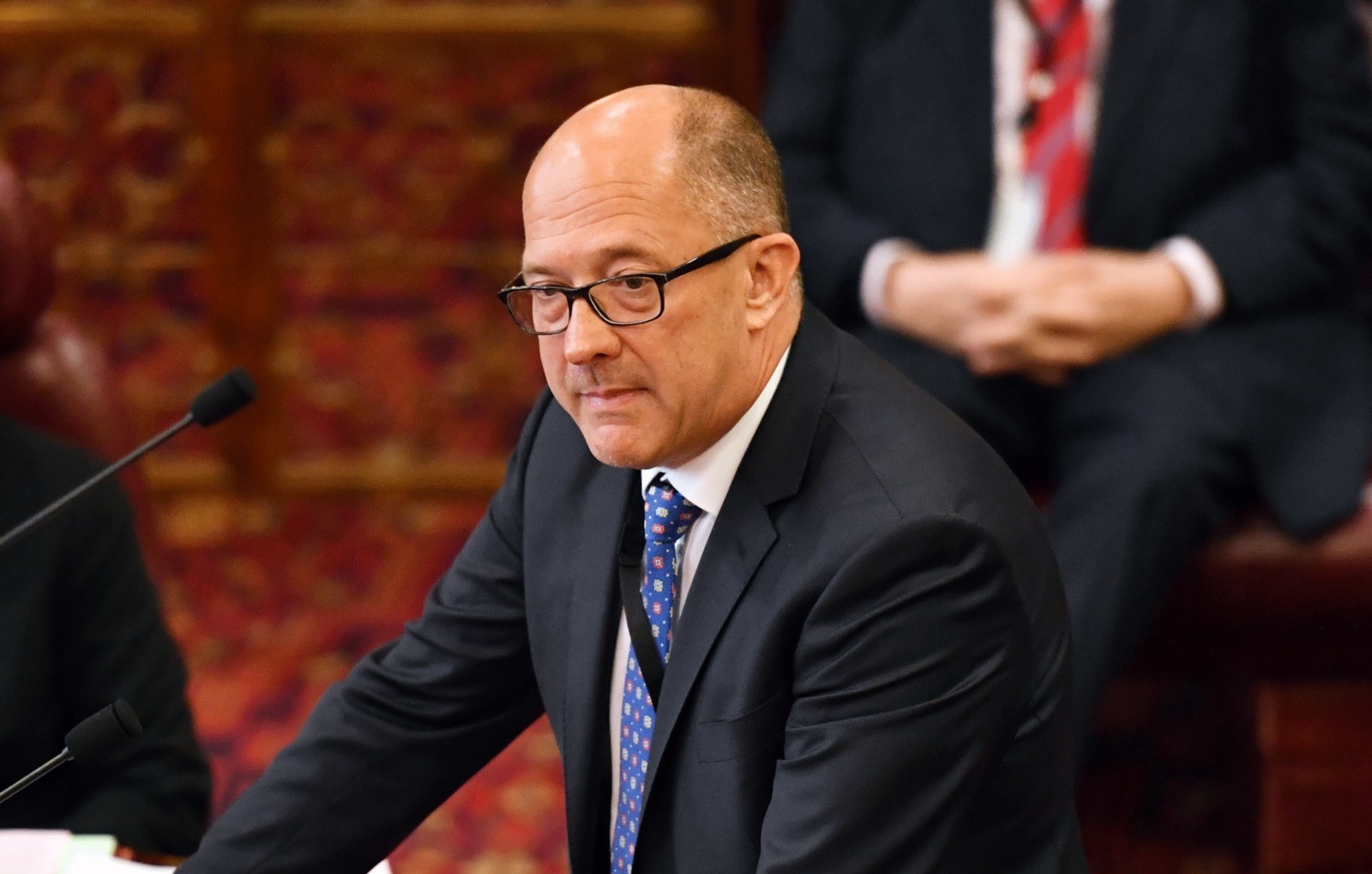A bill currently before New South Wales parliament is either a well meaning legislative attempt to offer grieving families justice, or an insidious attack on safe and legal abortion access by a religious zealot. It just depends on who you ask.
Christian Democratic Party MP reverend Fred Nile first proposed a bill in 2013 that would make it a crime to harm or destroy a foetus, and he's introduced iterations of the legislation in subsequent years.
However two factors might just help Nile get some version of his bill across the line this time.
The first is that the state's premier Gladys Berejiklian has indicated she is open to discussions about changing the law so that the state can pursue charges against a person who kills a foetus, following a horrific car crash that claimed the lives of two young women, one of whom was heavily pregnant with twins.
The second is that Nationals MP Trevor Khan has drafted a list of amendments to Nile's most recent bill, which he believes could satisfy all parties in this reignited debate over whether or not a foetus is legally a "person".
So what is foetal personhood? What would this law mean for pregnant women? Would it make abortion harder to access?

Called the Crimes Amendment (Zoe’s Law) Bill 2013 (No. 2), Nile's bill was put to a conscience vote in November 2013 and passed through the NSW lower house by 63 votes to 26. However the bill lapsed (no one in the upper house brought it forward) in November 2014.
The legislation is named “Zoe’s Law” because of Sydney woman Brodie Donegan, who was hit by a drug-affected driver in 2009. Her unborn child, named Zoe, died at 32 weeks. The driver was charged with grievous bodily harm to Donegan, but could not be charged with Zoe’s death.
Ahead of the upper house vote in 2014, women's rights groups and legal and medical associations raised concerns about the impact on abortion laws of giving a foetus legal personhood.
Donegan has repeatedly said she does not support Nile's bill.
Open letter to @frednile: you continue to use my daughters name in your laws. I have said many times I do not support this. Please stop now.
So what exactly does the bill do?
You can read it in its entirety here, but it essentially amends the Crimes Act 1900 to establish a separate offence for conduct causing serious harm to, or the destruction of, a "child in utero".
Why are people angry about it?
Adrianne Walters, a senior lawyer at the Human Rights Law Centre, said Nile’s bill “turns women’s bodies into battlegrounds”.
“It sets a dangerous precedent,” Walters told BuzzFeed News. “The foetus is given the status of a person and claims can then be made about its rights and interests by others, which then clash with the rights and interests of the woman.”
Walters believes the bill’s passage would further complicate abortion law in NSW, where a woman and her doctor can be convicted for an unlawful abortion.
Case law has established that abortion is lawful in NSW if the doctor has an honest opinion that continuing the pregnancy would be seriously harmful to the health of the woman.
“Women in NSW already have the spectre of criminal prosecution hanging over their heads when they seek an abortion, and this could force scared and vulnerable people away from safe healthcare at a time when they need it most, and potentially push them towards unsafe options,” she said.
The ramifications might not be limited to abortion, and women could end up in a similar situation to some jurisdictions in the United States, where women were prosecuted over their own miscarriages, Walters said.
“For example, a woman prosecuted for attempting suicide while pregnant, a woman sent to jail for having a miscarriage, women who have had a stillborn child being treated with suspicion and being subjected to inquiries about her pregnancy,” she said.
Criminal law in NSW already includes the loss of a foetus as part of the definition of grievous bodily harm, Walters said, and that is “appropriate”.
The NSW Bar Association does not support Nile’s bill, based on the broad definition of a “child in utero” and the potential implications of the legislation, especially for later term abortions.
“The Bar Association has consistently taken the position that the current New South Wales criminal law in this area is satisfactory,” the organisation said in a briefing note on Wednesday.

Julie Hamblin, a health law expert and consultant with HWL Ebsworth Lawyers, said the bill clearly states the offence would not apply to medical procedures or to conduct engaged in by or with the consent of the mother of the “child in utero”. Still, the exemption leaves women and abortion providers in an “uncomfortable” position.
“‘Child in utero’ is highly emotive and reflects a particular religious position that should have no place in legislation,” she said. “This is really testing the limits of those definitions, which are very important in the way doctors manage pregnant women.”
Why is a pro-choice MP going anywhere near this legislation?
Khan, who practiced as a criminal lawyer before he was elected in 2007, said that complainants in car accidents sometimes felt a single charge against someone responsible for ending the life of their foetus did "not reflect the enormity of their loss".
"I believe we can actually accommodate their grief without affecting what concerns so many people have in changing the law affecting abortion law reform,” he told BuzzFeed News.
Khan, who this year co-sponsored a successful bill to establish 150-metre buffer zones outside abortion clinics to protect patients from harassment, said he would vote against Nile’s bill in its current form.
"I didn't decide to introduce amendments so it would pass, I introduced amendments because I think it is an issue that will be dealt with when abortion law reform is addressed, and you can't simply shut this debate down."
What is Khan changing about the bill?
His first amendment replaces the term "child in utero" with “the foetus of a pregnant woman”.
"The change of the term recognises we are still talking about an injury that is occasioned on the mother, i.e. we are getting as far from a concept of foetal personhood as possible," Khan said.
The next amendment deletes "Zoe's Law" from the name of the bill.
"I haven't spoken to [Brodie Donegan] in some years but when I spoke to her previously there was this feeling that the danger was politicians were taking ownership in a sense of her private grief, and she wasn't entirely comfortable with that," Khan said.
Khan said Nile's bill applies to a pregnancy "from conception", whereas his third amendment sets a gestational limit of 24 weeks. The destruction of a foetus before this gestation would not be captured by the offence.
He has also included a section that essentially says if a woman’s foetus is harmed in the course of criminal activity, she could be liable to prosecution.
Hamblin finds this part of the amendments “shocking”.
“This opens up this whole issue about culpability of a woman for damage to her foetus,” Hamblin said. “Suppose a pregnant woman assaults someone in the course of a fight and she’s miscarried. 0Or if a woman drink drives and has an accident and miscarries as a result.”
Newcastle lawyer Catherine Henry, who represented a woman in a landmark case that became about the criminal status of abortion in NSW, said "at first blush" Khan's amendments "had a lot of promise", but she was also worried they might police "maternal conduct".
"I do think this addresses the issue of foetal personhood to an extent, but it still regulates women's behaviour in a way that isn't appropriate," she said.
"You can have a distinct provision that recognises the loss of a foetus maybe in health legislation, but you just can't have this tied up with regulating a woman's behaviour whilst pregnant, or you'll end up with a situation like in the southern states of America."
Anti-abortion lobby group Right to Life NSW, which strongly supports Nile's original bill, is not happy with the amendments.
"Pro-abortion MPs are keen to use this as a vehicle to draw a false, arbitrary distinction between unborn children at different ages," the organisation posted in a Facebook status this week.
"Make no mistake, drawing a line at 20, 22 or 24 weeks WILL make it easier to legalise abortion-on-demand up to birth."
So what's next with the legislation?
The last sitting day Nile can try and resuscitate this bill is November 15, on which Labor and Greens MPs have organised protests against the legislation.
